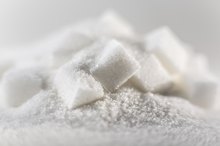Structure of Carbohydrates in Gatorade
If you're an endurance athlete, sports drinks are a good way to rehydrate and get a little energy boost. Gatorade is a well-known brand of sports drink 1. The carbs in Gatorade that give you that boost include sugar and dextrose, both simple sugars 1.
Structure of Sugar
Sugar is the No 2. 2 ingredient in a bottle of Gatorade after water 1. Sugar can mean a variety of different things when it comes to structure, but in Gatorade it's a disaccharide known as sucrose, which also happens to be the same type of sugar found in your sugar bowl 1. Sucrose is composed of two simple sugar molecules, glucose and fructose, that are chemically attached to form the disaccharide.
Structure of Dextrose
Are Gatorade and Powerade Healthy for Athletes?
Learn More
Dextrose is the third ingredient in Gatorade and is an even simpler sugar than sucrose 1. Dextrose is a monosaccharide -- meaning it's made up of one sugar unit -- and is another name for the simple molecule glucose. Glucose is your body's preferred source of energy.
How Your Body Uses the Carbs
While your body is able to get an almost instantaneous dose of energy when you drink Gatorade, the sucrose needs to undergo some digestion and metabolism before the carbs get where they need to go 1. First, the chemical bond that holds the glucose and fructose molecule together is broken down by the enzyme sucrase in your small intestines, then the glucose and fructose are absorbed. After absorption, most of the fructose in the drink is converted into glucose. Then the glucose is used or stored for later use.
Because it's already a single subunit, your body does not need to do anything with dextrose. You simply absorb it and use it for energy.
- While your body is able to get an almost instantaneous dose of energy when you drink Gatorade, the sucrose needs to undergo some digestion and metabolism before the carbs get where they need to go 1.
Watch Those Calories
Does Gatorade Give You Energy?
Learn More
As a source of carbs, electrolytes and water, Gatorade is beneficial to endurance athletes 1. And while the sports drink contains less sugar and calories than a can of soda, it's still a source of sugar and calories. Consuming more calories than you need, whether it's from a can of soda or a bottle of Gatorade, leads to weight gain 1. To keep weight under control when drinking Gatorade, be sure to count the calories it provides toward your overall intake 1.
Related Articles
References
- Gatorade: Thirst Quencher
- Food Insight: Background on Carbohydrates and Sugar
- Nutrition and Metabolism: Fructose Metabolism in Humans -- What Isotopic Tracer Studies Tell Us
- Science Learning: Digestive Enzymes
- Academy of Nutrition and Dietetics: Nutrition and Athletic Performance
- USDA National Nutrient Database: Carbonated-Beverage, Lemon-Lime Soda, No Caffeine
- Potera C. Diet and nutrition: The artificial food dye blues. Environ Health Perspect. 2010;118(10). doi:10.1289/ehp.118-a428
- Color Additives Questions and Answers for Consumers. Food and Drug Administration. Updated January 4, 2018.
- Malik VS, Popkin BM, Bray GA, Després JP, Hu FB. Sugar-sweetened beverages, obesity, type 2 diabetes mellitus, and cardiovascular disease risk. Circulation. 2010;121(11):1356-1364. doi:10.1161/CIRCULATIONAHA.109.876185
- Cordrey K, Keim SA, Milanaik R, Adesman A. Adolescent consumption of sports drinks. Pediatrics. 2018;141(6). doi:10.1542/peds.2017-2784
- Pearlman M, Obert J, Casey L. The association between artificial sweeteners and obesity. Curr Gastroenterol Rep. 2017;19(12). doi:10.1007/s11894-017-0602-9
- Health Effects of Sugary Drinks. Boston Public Health Commission.
- Sports Drinks. Harvard T.H. Chan School of Public Health.
- Cordrey K, Keim SA, Milanaik R, Adesman A. Adolescent consumption of sports drinks. Pediatrics. 2018;141(6). doi:10.1542/peds.2017-2784
- Field A, Sonneville K, Falbe J, Flint A, Haines J, Rosner B, Camargo C. Association of sports drinks with weight gain among adolescents and young adults. Obesity, 22(10), pp.2238-2243. doi:10.1002/oby.20845
- Story M, Klein L. Consumption of Sports Drinks by Children and Adolescents. An Issue Brief. Healthy Eating Research. Published June 2012.
- Trasande L, Shaffer R, Sathyanarayana S. Food additives and child health. Pediatrics. 2018;142(2):e20181408. doi:10.1542/peds.2018-1408
Writer Bio
Jill Corleone is a registered dietitian and health coach who has been writing and lecturing on diet and health for more than 15 years. Her work has been featured on the Huffington Post, Diabetes Self-Management and in the book "Noninvasive Mechanical Ventilation," edited by John R. Bach, M.D. Corleone holds a Bachelor of Science in nutrition.









